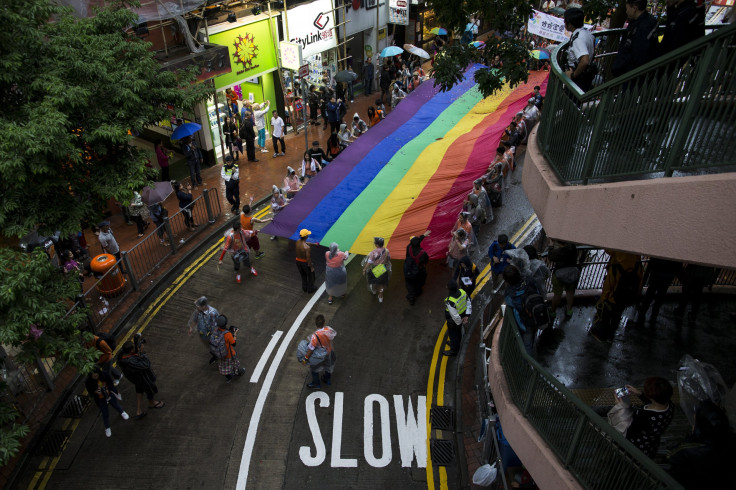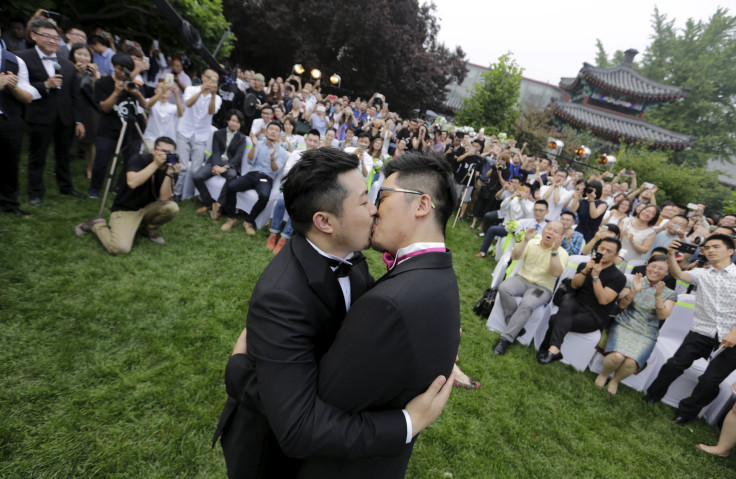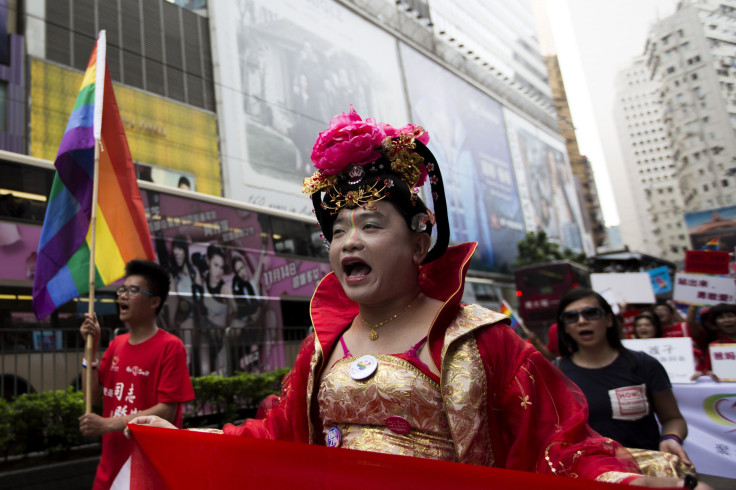Chinese Student Comes Out At Graduation Ceremony, In Historic First Inspired By US Gay Marriage Ruling

SHANGHAI -- Wan Qing, a 22-year-old Chinese university student, may just have taken a historic step forward for China’s gay community in its journey toward openness and social acceptance. The student at Sun Yat-sen University in the southern city of Guangzhou took the stage at her graduation ceremony this weekend draped in a rainbow flag -- and announced to the university’s president that she was coming out as a lesbian. She then asked Prof. Luo Jun if he would be prepared to “make a gesture of support for sexual minorities."
What happened next was shown in photos Wan posted on Chinese social media: the president gave her a hug and, smiling, raised his fist, as Wan had done, in a gesture of solidarity with the gay and lesbian community.
In a country where few people come out in public, and where it’s estimated that the vast majority of homosexuals still marry members of the opposite sex because of social pressure, it was a remarkable moment. And according to Wan, it was inspired by the U.S. Supreme Court’s decision to recognize gay marriage the previous week:
“I hope that sexual and emotional desire between women will be recognized and accepted by society,” she wrote on social media. “I hope the legalization of gay marriage [in the US] will not be the end but a starting point for equal rights, and that those who don’t marry will also get equal rights from society.”

Wan also posted a series of photos of her and classmates wrapped in the rainbow flag, which were quickly picked up and reposted by other Internet users and student groups at other Chinese universities.
“I felt very excited when I heard what she had done -- it’s very courageous,” Ah Qiang, head of Guangzhou-based activist group Parents and Friends of Lesbians and Gays (PFLAG) China told International Business Times. “This will be a very big encouragement to other young gay and lesbian people in China -- it’s very positive, and will have a big impact.”
There have been public debates on homosexuality at other universities in China, he said, and a number of universities now have gay and lesbian student groups. However Ah Qiang said this was the first time he knew of a student making such a public statement, adding that it was a further sign of the significant impact the U.S. Supreme Court ruling has had in China. The past week has seen unprecedented debate on the topic in China -- and a nation where homosexuality was only decriminalized in 1997, and was barely publicly acknowledged even 15 years ago, has now seen a raft of articles on gay marriage in mainstream media.
“I think the U.S. decision will have a very positive impact in China in the long term,” Ah Qiang said. “A lot of Chinese media want to report on this topic, this gives them the chance.”
Steven Bielinski, founder of WorkForLGBT, a Shanghai based nonprofit platform for business inclusion of the gay community, and the organizer of China’s first ever LGBT job fair this year in Shanghai, told IBTimes that the wider social response to the U.S. ruling has also been “unprecedented.”
A range of companies adopted rainbow logos to celebrate the Supreme Court ruling last week, he noted, “and they didn’t just change their logos -- half a dozen also posted detailed messages of support via social media.”
Significantly these included not just privately run new media companies, which have a reputation for being more open -- like Alibaba’s Taobao, which recently arranged for seven gay Chinese couples to fly to California to get married -- but also mainstream businesses like home electronics manufacturer Haier, a former state-run enterprise in the northern city of Qingdao.
“It’s a great start -- and it allows people to go back to these companies later on and hold them to a higher standard in the future,” Bielinski said. “I believe progress is going to be fast.”

Wan did not comment on how her decision to come out so publicly might affect her job prospects -- but Sun Yat-Sen University is seen as one of China’s most liberal academic institutions, and has had a gender studies program for the past decade. One of Wan’s professors was quoted by the official Global Times as saying that her public statement reflected progress in China's education system and “may even encourage other universities to attach more significance to education on sex and sexual orientation."
Nevertheless the professor asked not to be named, and the Global Times quoted campus media as saying that some professors from the university’s branch of the official Communist Youth League had asked for photos of Wan with the rainbow flag to be deleted from the university’s social media account because these might have a “bad influence.” And the Global Times newspaper also reported Monday on the difficulties faced by gay people working in government institutions or state-run companies in “coming out” -- in a reminder that Wan’s bold move may be just one more step on a long journey for China’s gay community.
© Copyright IBTimes 2024. All rights reserved.






















